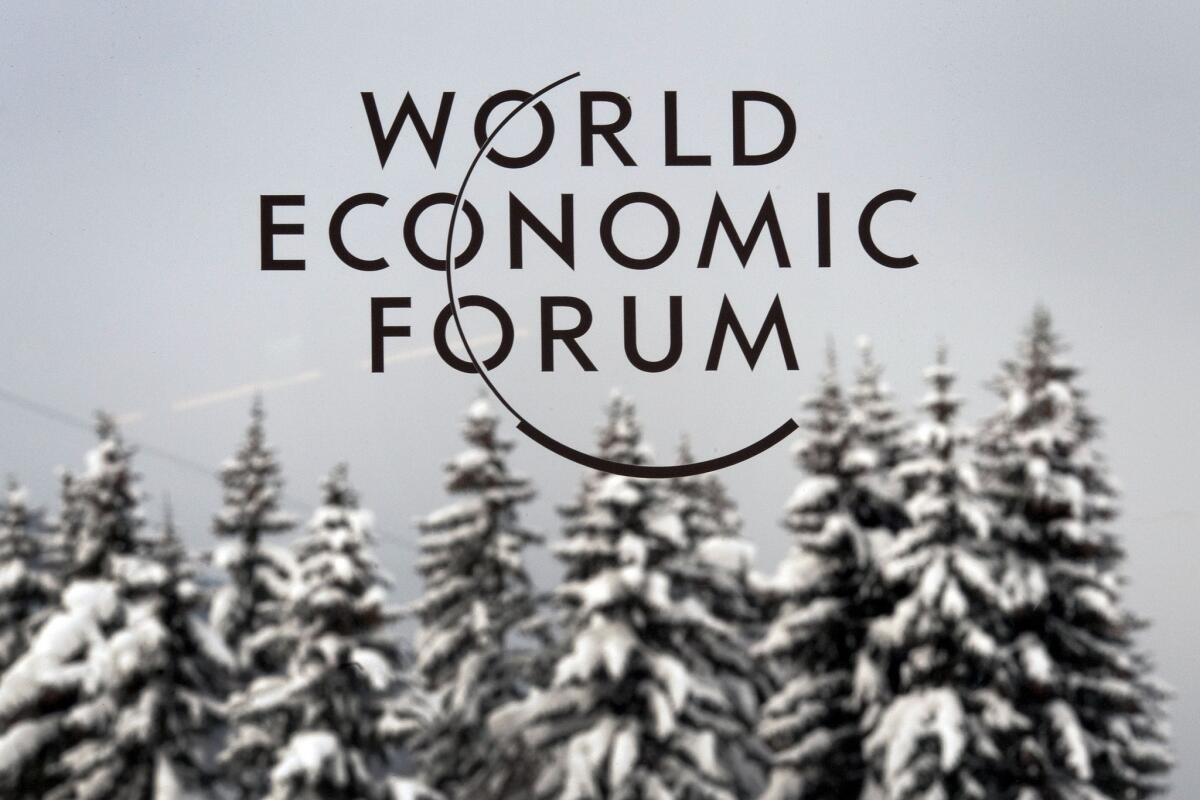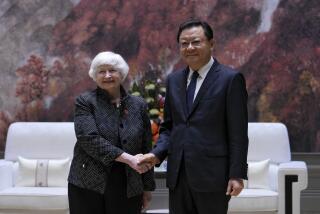Op-Ed: What China’s premier should say at Davos

When global leaders toast the start of the World Economic Forum in Davos, Switzerland, this week, one unusually prominent guest should be ready for sharp criticism — Premier Li Keqiang of China, the country’s highest-ranking attendee since 2009. Following a year of slowed growth and mounting accusations that it has been discriminating against foreign firms, China’s relationship with its international partners is seriously souring.
Foreign businesses have long protested protectionist policies in China, but they have recently been alarmed by a new pattern: Chinese officials applying seemingly neutral corruption and antitrust laws to target foreign firms, including Eli Lilly, Volkswagen, Qualcomm, Johnson & Johnson, Microsoft and Samsung.
In an environment of heightened fears, the European Chamber of Commerce in China recently counseled its members on how to avoid “a sudden knock at your door” from investigators, who have at times been notoriously crude. These companies’ concerns have been answered by quips that foreign companies should “hire the most famous lawyers in the world,” as Xu Kunlin, a Chinese economic official, told reporters. A change in tone is sorely needed.
But if the Chinese leadership is going to continue targeting foreign companies in 2015, it must go beyond reassuring rhetoric and set out better and clearer standards for doing business in China. Li’s Davos appearance affords the perfect opportunity for China to announce concrete ideas about how it can replace its current scattershot approach with a balanced and credible system of enforcement.
In ramping up use of its 2007 anti-monopoly law against foreign companies, while giving its huge state-owned enterprises free passes, China has greatly escalated tensions about the uneven playing field many global companies have long experienced there. In the United States, these Chinese actions are even threatening U.S. business support for a positive engagement policy with China.
Chinese officials have thus far claimed that multinational firms are the focus of only 10% of antitrust cases, but foreign business advocates have put the figure as high as 50%. Regardless of which side is correct, China’s leaders must realize that even the perception that they are targeting foreign businesses disproportionately can create great harm. Like corrupt or monopolistic behavior itself, improperly motivated prosecutions threaten the integrity of the marketplace and the public sector, eroding investor confidence and harming China’s reputation.
Foreign business leaders have reason to be skeptical. Chinese anti-corruption initiatives, for example, have historically been highly ideological and anti-Western. In 1983, Communist Party conservatives led a major campaign against the influence of “foreign capitalists” in coastal cities where joint ventures and foreign trade were flourishing — as were some amount of smuggling and graft.
Demanding “a hard and resolute strike, like a thunderbolt,” this national campaign grew as emboldened conservatives also initiated a campaign against “spiritual pollution,” meaning the “sugarcoated bullets” of “bourgeois ideology” and “capitalist forces.” But Deng Xiaoping brought the tumult to a stop once he realized that it risked permanently throwing the country off its reform trajectory.
China’s leaders were able to correct for mistakes then, in 1983, without permanently damaging business ties. But 30 years later, Beijing can’t afford the perception that its investigations are capricious, ideological or xenophobic. China is now a key player in the global economy, and the partnerships between foreign companies and the Chinese business community are the bedrock of many of its bilateral relationships.
We recommend that three principles guide China’s efforts to restore trust in the year ahead. First, Beijing should embrace transparency. The government should disclose data on prosecutions so there is no uncertainty about statistically disproportionate targeting. It should also provide clarifications to companies that continue to express confusion over the legal rights of targeted firms and the specific responsibilities of each enforcement agency. In the words of Justice Louis Brandeis, who was quoted approvingly by China’s top legal official in 2013, “Sunlight is said to be the best of disinfectants.”
Second, Beijing should open up channels that allow companies to consult regulators to further reduce uncertainty. To clarify anti-bribery rules, this could entail adopting something akin to the Foreign Corrupt Practices Act’s “opinion procedure” in the U.S., which allows companies to ask officials whether specified, prospective conduct would conform to the government’s enforcement policies. Despite a clarifying interpretation from top legal officials in 2012, ambiguities still bedevil even compliant companies.
Finally, the government should in fact enforce its regulations the same way for both foreign and domestic companies on the basis of a principle of impartiality. Legislatively, this means removing provisions of the country’s anti-monopoly law that compel regulators to take into account domestic industrial considerations when making enforcement decisions. Though the bounds of prosecutorial discretion are expansive, they are not limitless. Modern economies do not turn corruption or monopoly laws into weapons for advancing protectionist policies.
Many of these principles were recently endorsed at the Fourth Plenum of the 18th Central Committee, but this is the moment for Beijing to decide whether to translate these ideas into concrete action in the field of foreign trade and investment, and how quickly. Li’s visit to Switzerland is a perfect opportunity to announce a reformed system of enforcement — an economic fundamental for the emerging 21st century Chinese system.
Julian B. Gewirtz and Mark Z. Jia are Rhodes scholars researching modern Chinese law and history.
Follow the Opinion section on Twitter @latimesopinion
More to Read
A cure for the common opinion
Get thought-provoking perspectives with our weekly newsletter.
You may occasionally receive promotional content from the Los Angeles Times.






